- Home
- Anne Easter Smith
A Rose for the Crown Page 12
A Rose for the Crown Read online
Page 12
The tall beech and rowan trees gave her some respite from the sun, but they also caused shadows that could readily hide a boy. Kate was beginning to get impatient when a voice came out of the copper beech behind her.
“Ha, ha, my fine lady! You be too concerned with your muddy shoes to look up and see where I be hiding!”
Geoff clambered to the ground and stood with his legs apart, grinning at his sister. He was tall for his nine years, with the promise of physical prowess, except for his arm. The year before, he had fallen from an apple tree and broken his left arm badly. It had not mended well, and its growth was forever stunted, severely compromising his ability to be of much use on the farm. Richard had offered to take the lad on as a page, promising to teach him his letters, so that he might learn to be a clerk. John was reluctant to let Geoff leave—even a one-armed field hand was better than none. However, John’s new wife, Joanna, urged John to let the boy go, arguing that Geoff would have a more promising future at Ightham. Besides which, Joanna was pregnant—she and John hoped for another son—and, Joanna pointed out, Geoff’s was a large mouth to feed.
The boy was devastated to learn of his fate. His world revolved around the seasonal routines of the farm; he and Johnny were very close and he felt safe there. He cried himself to sleep, praying that some act of God would save him from having to leave the home he loved. Then one early spring evening, he recognized the horse tethered to the hitching post in the farmyard. It belonged to Ralph, the groom from Ightham.
That was three months before, and Geoff’s instincts had been right. As a boy, he was expected to hold his own in the Haute household. He got none of the gentling Kate had had from Richard. When Elinor heard she was to put up with yet another Bywood child, she redoubled her efforts to make both siblings regret they had ever heard of Ightham Mote, this time concentrating most of her resentment on Geoff. He was a far more satisfying target, because he had none of Kate’s boldness nor was he under Richard’s constant protection. The boy was quick to learn his reading and writing, and when the chaplain complained about his willful pupil—which was often—Elinor took great pleasure in ordering a beating or assigning him more than his share of menial tasks, such as emptying the family chamber pots and cleaning the cooking pots, to “improve his character.” Geoff dared not complain to Richard about his treatment for fear of aggravating Elinor further. His only joys were found near his big sister and in the woods, where he went in secret to search for nature’s treasures.
“You do try my patience, Geoff,” Kate said crossly. “’Tis good news I bring you, and now methinks I shall not tell it.” She pointed to the nest he was retrieving from the crook of a branch, and her interest was piqued. “What is it you have there?”
“If you tell me the news, then I’ll show you this,” he teased, hiding the nest behind his back. His impish twinkle and her own dirty shoes reminded Kate of that September day at the river when they had both been covered with mud.
“What be so funny,” Geoff complained. “You be hard to understand, sister. One minute you be angered and now you laugh. Truly, girls be hard to understand.”
“My muddy shoes reminded me of Matty’s first birthday! Remember, when we both ended up in the river? Heavens, Mother was angered at me that day, was she not?”
Geoff grinned. “Aye, and Father. I remember it well.” He brought the nest out from behind his back and thrust it at his sister.
“So, what be the news you have for me?”
“In truth, I almost forgot! Cousin Richard has given his word that you and I shall travel home next week! ’Tis wonderful news, don’t you think?” Her eyes were shining as she took the nest and examined it closely. “Thrush,” she murmured. “I thought I heard one as I entered the wood.”
“Aye, it be a thrush’s, but the babies be long flown away. Home! You be jesting? ’Tis too good to be true!”
“Nay, I speak the truth. Joanna is close to her time, and I asked Cousin Richard if I might go to her for the birthing. Cousin Richard agreed that both of us should go, and we leave in a few days.” Both siblings stood silent for a moment, recalling their memories of the last birth at Bywood Farm.
It had taken him a year after Martha’s death, but John Bywood, being a practical man, knew he could not manage for long without a partner. Joan had married one of the field hands and moved to a nearby village, and Matty was only two and in need of mothering. Joanna was daughter of an innkeeper on the outskirts of Tunbridge, where John would stop to slake his thirst after market day. She was cheerful, buxom and sensible and had spent her life helping out at the inn. She was also a good cook and had an independent spirit.
On a previous visit by Kate to the farm, she and Joanna had become acquainted, and Kate had been none too friendly. Joanna was not offended by Kate’s attitude one whit. She was her usual cheerful self, chattering to Kate as if she had known her all her life, and in a matter of days Kate had been won over.
“I shall never try to replace your mam, Kate,” Joanna said one evening as she prepared a rabbit for stew and Kate chopped some carrots. “I just want to be a good wife to your father and look after the young ’uns, and one day maybe”—she paused in the skinning and took a sideways look at Kate—“I shall hold my own child.”
Kate had smiled her understanding, and a bond was formed. She thought now of Joanna’s wish as she and Geoff walked back past the stew-pond. She was happy for the young wife but shuddered at the thought of witnessing another birth.
Anne was waiting for Kate at the far end of the courtyard, so Geoff waved cheerfully and ran off to the kitchens, hiding the nest under his shirt. When Anne caught sight of Kate’s muddy hem and shoes, she began wringing her hands in her apron pocket.
“Kate! Look at your shoes! I cannot bear to see Mother angry with you again. She has been calling for you this past half hour to cut more herbs for the dispensary.”
“Fiddle-faddle!” Kate used her favorite expression airily. She looked down at her shoes and then at Anne’s anxious face. “What shall I do, dear Anne? I have no wish to cause trouble with your mother.”
“If you go into the herb garden now, Mother need not know where your shoes took on the mud. ’Tis for certain muddy, too.”
Kate gave Anne a brilliant smile. “Thank you, cousin. You are so clever.” She was rewarded by a blush of pleasure.
IT WAS RAINING HARD when Ralph, Geoff and Kate trotted up the lane towards Ivy Hatch. Ralph was none too pleased at having to ride to the Bywood farm in such conditions, but the brother and sister had already waited a day for the weather to change, and when it seemed there was no letup to the rain, Richard ordered Ralph to saddle up and go, rain or no rain. Richard was also sparing Ralph for the haying at Bywood Farm for a few days. As head groom, Ralph considered haying beneath him, but he had developed a kindly feeling for the Bywood family during his brief visits there and did not mind helping John. Besides, Richard gave him extra payment for his labor, so he went quite willingly.
By the time the riders reached the low Weald and made their way through more cultivated land, they were soaked through. Kate sang to herself to try and keep her mind off the cold, clammy clothes that clung to her like a mustard poultice left to cool, and Geoff curled his body under Ralph’s protective cloak on their shared horse.
When he began to recognize landmarks, Geoff begged Ralph to put the horse to a fast trot for home. Ralph smiled and humored him. Kate followed at a distance, not wanting to arrive completely spattered with mud from the leading horse. Within a few minutes, they were clattering into the familiar farmyard, sending chickens flying and Fenris into a tail-spin of joy. They had arrived in time for the midday meal, and Ralph was pleased with himself for covering the miles so quickly. The front door flew wide, and Johnny and Matty came running out to greet their siblings while John and Joanna stood on the doorstep, calling their welcomes.
Johnny swung Kate down and clamped his arms around her waist.
“Johnny, Johnny, you do take th
e breath from me, I swear!” Kate laughed and kissed him. Then he turned to Geoff and thumped his brother several times on the back. Johnny was still the quiet one, while Geoff, now in his element, jumped up and down with Fenris, pumping his brother’s hand.
Matty hung back shyly.
“’Tis good to see you, sweeting. Let me look at you.” Kate bent down and appraised her little sister. In a few months she would turn four. She had lost her toddler chubbiness and now looked like a diminutive version of Martha. Matty clung to the security of Joanna’s skirts, and Kate felt a twinge of sadness, remembering that at one time Matty had come to her for comfort. Joanna marshaled Geoff and Matty into the kitchen and out of the rain, while Johnny and Ralph took the horses to the barn, shooing some chickens out of their way. John had held back in his quiet way, but as soon as she saw him, Kate was in her father’s arms, savoring the warmth of his embrace. Then she remembered Joanna standing by and turned to greet her stepmother respectfully. Joanna laughed, because Kate could not get near to kiss her cheek as Joanna was very big with child.
Kate noticed the healthy glow on the young woman’s cheeks and anticipated this birth would be very different from the last one that had taken place under this roof. In fact, John had added another chamber to the farmhouse with a doorway under the staircase, leaving the second floor to the children. It was in the new room that Joanna would give birth, she was told—a relief for Kate, whose memories of Martha’s lying-in and death would forever be associated with the loft.
Joanna was a picture of contentment, and she hugged Kate as best she could. “Aye, I be truly happy, Kate. And knowing you will be here to help with the birthing is good comfort,” she said, once again admiring John’s lovely daughter. “But first we must celebrate your birth date in style. It’ll be time for you to be married yourself ere long!” She went off into peals of laughter, at which Kate blushed, dismissing the idea as absurd.
John smiled to himself.
THE DAY OF KATE’S BIRTHDAY dawned gray and lowering. July 15th was St. Swithin’s Day, and the saying went, “If it be raining on St. Swithin’s Day, it will rain for forty days thereafter,” and the harvest might be ruined.
But though it threatened, it did not rain. Everyone took part in the haying except Joanna and Matty, who arrived at midmorning with bread, meat, cheese and barley water for the workers. Joanna had had one or two pains earlier in the day, but if she was worried about going into labor at any moment, she kept it to herself.
Later, she and Kate busied themselves with food for the evening feast in the farm kitchen, and Kate was glad she had learned a few things from helping in Ightham’s kitchens. The food was plain compared with the Mote’s, but Joanna knew how to make mouthwatering pies from the rabbits, quails and pheasants John and Johnny had shot or snared over the past few days. Joan would soon arrive to join her husband, bearing more food and her new baby, and when the table was ready, it was piled high with the best a small farm could prepare.
After the meal, John stepped forward and raised his cup. “I be right glad to see all of you on this joyous day. St. Swithin be praised we had no rain, and the Lord God be thanked for giving us of his bounty. I be blessed with a good wife and healthy children.” The shy man grinned at his wife and was encouraged by a nod and a smile from her to go on. “Come, lift your cups and drink to my eldest, Kate, who today be thirteen years. I know her mam—God rest her soul—would be right proud of her, as I be.” He paused. “But I think now ’tis time our young lady had a husband. And so, it seems, does Master Haute.”
Everyone raised their cups in Kate’s direction and wished her well. Kate gracefully acknowledged their kindness, then turned her attention back to her father.
“What do you mean ’tis time I had a husband? And how do you know Cousin Richard’s wishes?” She tried not to sound too excited. Was Richard arranging for her to marry George?
On Richard’s instructions, Ralph had relayed a confidential message to John earlier in the evening. “’Tis private business, Kate, and you should not question me. Now attend to your guests.” John was firm, and Kate had to be satisfied. She looked around the room at these simple people who loved her for herself and not for her new finery or manners. Her father, his cheeks rosy from strong cider and pride in his hearth and family, had retreated behind Joanna, his hand resting on her shoulder. Joanna had Matty on her knees, and her arm encompassed Geoff. Innkeeper Ben sat on the other side of his daughter, enjoying an evening away from work. And Johnny was quietly whittling a stick, one eye on Kate and the other on his task. They were expecting her to say something, but she knew that if she tried, she would cry, so she smiled and nodded her thanks instead.
It was Ralph who broke the awkwardness. “Why! I forgot I have something for Mistress Kate.” Jumping up, he ran out of the door to his lodging in the stable.
Kate looked puzzled. “What could it be?”
“A gift?”
“I wonder what . . . ? ”
Ralph was back in a trice carrying a large velvet bag tied with a ribbon and held it out to Kate. The children moved closer as Kate tugged at the knot. She pulled out a hard object wrapped tightly in a length of wool cloth. As she removed it, they all heard the distinctive twang of a harp string. Squealing with joy, Kate drew off the cloth to reveal a polished, elegant harp of her very own. A vellum note was tied to the beautifully carved head of an angel that formed the top of the instrument, and Kate read aloud to the awed company:
“It is Anne’s wish you should have this harp for your special day. For the many times you have brought pleasure to this house with your playing, dear Kate, we thank you. Think on us each time you play. Richard and Elinor Haute.”
Kate was flabbergasted. “I cannot believe . . . ’tis too generous . . . my own beautiful harp!” She turned the exquisite piece this way and that, examining its intricate carving and lovingly fingering the strings. The company insisted she sing to them. She tuned the strings for a few minutes, deliberating on an appropriate song. She caught sight of Joanna, so great with child, and chose a sprightly air, an old French song about a young girl’s fancy for a monk.
“Ah, si mon moine voulait danser
Un capuchon je lui donnerai—”
Joanna shot her a smile, and the others tapped their feet and listened, fascinated by the intertwining of the harp’s tinkling sounds and Kate’s high, sweet voice. Only Kate understood the French, but the group enjoyed the rhythm and spirit of the song. When it was over, they cheered and lifted their cups to her all over again. But it was getting dark, and the field hands needed to return home to rest for the next day’s labor.
Kate embraced her cousin. “Farewell, dear Joan. May God bless you and yours.” She feared it might be a long time before their paths would cross again.
WHEN JOANNA ROSE from her seat on the bench to bid her guests farewell that evening, she felt her water break. As soon as Kate returned from the farmyard, Joanna whispered to her to put the children to bed. Then she went into her chamber to ready herself for the task ahead.
Kate was impressed by Joanna’s calm, which transferred itself to her, and she took charge of the house without delay. She told her father to clean up the kitchen, which would keep him busy and his mind off the possibility of losing another wife or child in childbirth.
John was fortunate to have four healthy, living children. Many of his fellow farmers and neighbors had lost sons and daughters to plague, smallpox, sweating sickness, and lesser ailments that quickly developed into life-threatening conditions. However, Joanna came from healthy stock and had the girth for bearing children. By midday, Thomas By-wood was born with a minimum of fuss and much joy for both the parents and Kate. John now had a third son, a boon to a farmer.
Joanna glowed with pride as she showed her husband the lusty baby who was squirming in her arms. Kate discreetly tiptoed from the room, carrying the soiled cloths with her. Two days later, Joanna was up and about but grateful to have Kate there to see to Matty and feed th
e hungry men and boys when they returned from the haying.
At the end of the week, when the last haystack was piled, Ralph decided it was time for them to return to the Mote. This time Kate was impatient to be back. Her father had not yielded to her pleas to divulge the contents of Richard’s letter, but she was firmly convinced she and George Haute were the subject.
THE SOUND OF KATE’S SOBBING carried up from the stables and through the great hall, and the news of her fate spread like an autumn wildfire. Only a few romantic souls felt sorry for her; most of the household thought the poor cousin should thank her lucky stars for her good fortune.
Kate was to be married. It had been arranged during her absence at Bywood Farm. Elinor had made an initial promise unbeknownst to Richard several months earlier. However, he had had no objections and was one of those who felt Kate should be grateful for Elinor’s negotiations.
Kate had returned to Ightham in high good spirits to be greeted by Anne, who was waiting by the stables to break the bad news.
“But I do not even know him,” Kate wailed, when Anne told her of her intended bridegroom. “Thomas Draper? Who is he? I want to marry George! He is my one true love!”
She flung her bonnet on the ground and jumped on it. As Kate’s tantrum began to build, Richard arrived in the stable doorway. He watched for a moment and then he threw back his head and laughed.
“Ha! My fair little friend. So, you want to be an old maid, is that it?”
Kate stopped jumping and faced him squarely. Anne recoiled several steps, retreating from the impending fracas. Kate picked up her bonnet and resolutely walked up to Richard, her chin jutting forward and her mouth in a stubborn line.

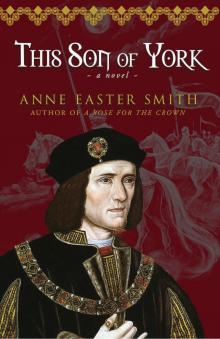 This Son of York
This Son of York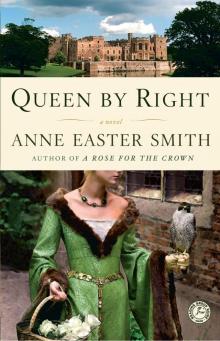 Queen By Right
Queen By Right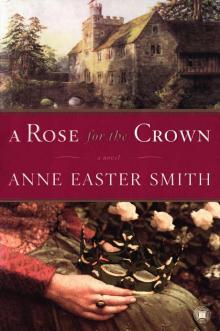 A Rose for the Crown: A Novel
A Rose for the Crown: A Novel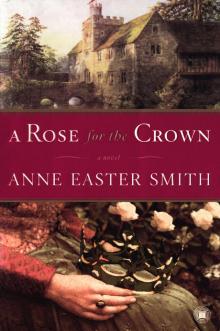 A Rose for the Crown
A Rose for the Crown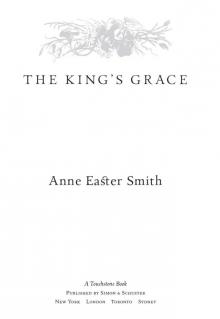 The King's Grace
The King's Grace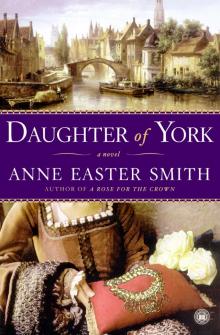 Daughter of York
Daughter of York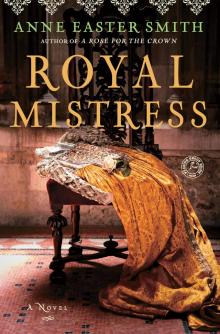 Royal Mistress
Royal Mistress